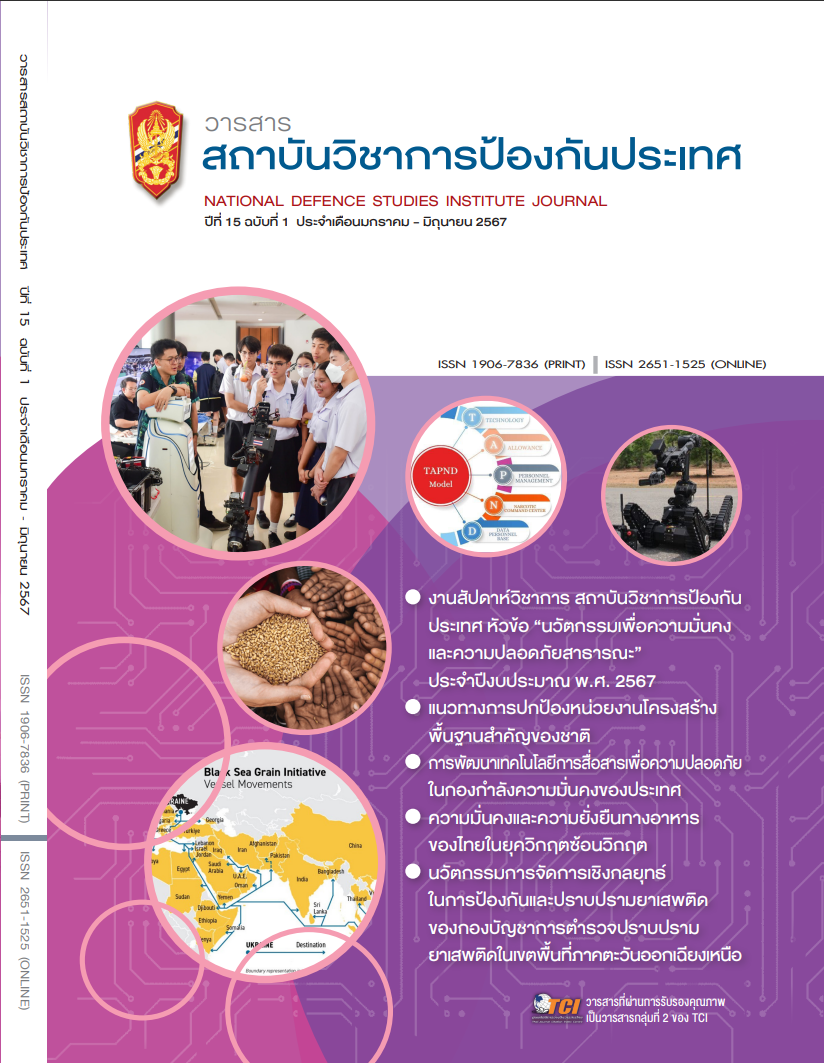The Factors Analysis of Affecting Success of New Government Fiscal Management Information System (NEW GFMIS THAI) Implementation:A Case of Royal Thai Air Force
Main Article Content
Abstract
This study aims to analyze the impact of various factors on the successful implementation of the New Government Fiscal Management Information System (New GFMIS Thai) in the Royal Thai Air Force, comprising of basic agency controls, work system controls related to the New GFMIS Thai system, operational behavior of staff, and agency support. The study relied Purposive Sampling on the perspectives of 325 Air Force officers, with the questionnaire serving as a data gathering tool. The structural equation modeling was used for data analysis.
The findings revealed that the most positive factors influencing the success of implementing the New GFMIS Thai system in the Royal Thai Air Force are the Operational behavior of staff, which include knowledge of the computer and the new GFMIs Thai system, as well as understanding of the work system, intention, and focus on the task. The next factor is the work system controls related to the New GFMIS Thai system. The basic control system, this is a factor that has a negative impact as it involves changes in the entry process and the application menu on the system is different from the original system. There is no influence detected for the agency's support factors. All these factors can explain the New GFMIs Thai implementation's success of up to 35.0 percent.
Article Details

This work is licensed under a Creative Commons Attribution-NonCommercial-NoDerivatives 4.0 International License.
The articles, images, tables, graphs, written content, and opinions published in this journal are solely those of the authors and do not necessarily reflect the views or positions of the National Defence Studies Institute or its academic affiliates.
References
กรมการเงินทหารอากาศ. (2564). 73 ปี กรมการเงินทหารอากาศกับการเป็นศูนย์ระบบการเงินที่พร้อมบริการด้วยความซื่อสัตย์ ถูกต้อง โปร่งใส ตรวจสอบได้ และทันเวลา. สืบค้นจาก https://finance.rtaf.mi.th/images/Pdf_file/บทความระบบ_ECS_สถาปนา_กง.ทอ.73_ปี-ปรับแก้ใหม่.pdf
กระทรวงการคลัง. (2565). แนวทางการขึ้นระบบบริหารการเงินการคลังภาครัฐแบบอิเล็กทรอนิกส์ใหม่ (New GFMIS Thai). สืบค้นจาก https://www.gfmis.go.th/?p=2586
ฐิติรัตน์ ชูไกรพินิจ, เกียรตินิยม คุณสันติ, ชำนาญ งามมณีอุดม, ธนานันต์ มีชูทรัพย์, และวรวรรณ จิรไกรศิริ. (2555). ความคิดเห็นของผู้ปฏิบัติงานต่อการใช้ระบบการบริหารการเงินการคลังภาครัฐแบบอิเล็กทรอนิคส์ (GFMIS) ระบบจัดซื้อ/จัดจ้างในมหาวิทยาลัยเกษตรศาสตร์. วารสารวิทยาลัยพาณิชยศาสตร์บูรพาปริทัศน์, 7(2), 67-75.
เดชพงศ์ นาคเสวี. (2557). การประเมินผลการยอมรับการใช้ระบบสารสนเทศโรงพยาบาลของศูนย์ศรีพัฒน์ คณะแพทยศาสตร์ มหาวิทยาลัยเชียงใหม่ (การค้นคว้าแบบอิสระ). สืบค้นจาก https://archive.lib.cmu.ac.th/full/T/2557/mpa40557dn_tpg.pdf
ทิพย์ประภา สีชาเหง้า. (2562). ปัจจัยที่มีผลต่อการปฏิบัติงานด้านบัญชีด้วยระบบ GFMIS ของหน่วยงานศาลในสังกัดสำนักศาลยุุติธรรมประจำภาค 4. วารสารวิชาการและวิจัย, 10(1), 88-98.
พัชรินทร์ ศิริทรัพย์. (2558). ผลกระทบการใช้ระบบบริหารการเงินการคลังภาครัฐแบบอิเล็กทรอนิกส์ GFMIS ที่มีผลต่อคุณภาพรายงานการเงินของหน่วยงานราชการ กรณีศึกษา อำเภอพระนครศรีอยุธยา (วิทยานิพนธ์ปริญญามหาบัณฑิต). สาขาการบัญชี คณะบริหารธุรกิจ มหาวิทยาลัยเทคโนโลยีราชมงคลธัญบุรี.
ศิริไพร สินประกอบ. (2563). ผลกระทบของการจัดการความเสี่ยงในระบบ GFMIS ที่มีต่อคุณภาพของงบการเงินกรณีศึกษาส่วนราชการเขตภาคตะวันออกเฉียงเหนือ (วิทยานิพนธ์ปริญญาบัญชีมหาบัณฑิต). คณะบริหารธุรกิจ มหาวิทยาลัยเทคโนโลยีราชมงคลอีสาน.
ศิริวัฒน์ เปลี่ยนบางยาง. (2558). ประสิทธิผลของการใช้เทคโนโลยีสารสนเทศในการปฏิบัติงานของเจ้าหน้าที่องค์กรปกครองส่วนท้องถิ่น. วารสารวิชาการ Veridian E-Journal ฉบับภาษาไทย มนุษยศาสตร์ สังคมศาสตร์ และศิลปะ, 8(3), 1051-1062.
ปาลิดา เชษฐ์ขุนทด, อุสารัตน์ เจนวณิชยานนท์, อาทิตยา เลี้ยงวัฒนหิรัญ, ปรียาณัฐ เอี๊ยบศิริเมธี, และวิลาวรรณ ชูกลาง. (2565). ปัจจัยที่มีผลกระทบต่อประสิทธิภาพการจัดทำบัญชีในระบบการบริหารการเงินการคลังภาครัฐแบบอิเล็กทรอนิกส์ (GFMIS) ในเขตอำเภอเมือง จังหวัดนครราชสีมา. วารสารวิชาการมหาวิทยาลัยปทุมธานี, 14(1), 41-56.
ละเอียด ศิลาน้อย. (2562). การใช้มาตรประมาณค่า ในการศึกษาวิจัยทางสังคมศาสตร์ มนุษยศาสตร์ การโรงแรม และการท่องเที่ยว. วารสารบริหารศาสตร์ มหาวิทยาลัยอุบลราชธานี, 8(15), 112-126.
Best, C. H. (1977). Computers and human communication. New York: Holt, Rinehart and Winston.
Sami, P., Sabri, U., Ilyas, M., & Amjad, Z. (2012). Organizational Culture and Its Impact on the Job Satisfaction (Research Report). Pakistan: University Teachers of Lahore.


